Gender, Sexuality and Social Changes
VerifiedAdded on 2023/06/03
|9
|2590
|470
AI Summary
This essay discusses the social issues related to gender and sexuality and the required actions to eliminate these issues for social changes. It also explores the different terms related to sexuality and gender and the support services available for LGBTI youth.
Contribute Materials
Your contribution can guide someone’s learning journey. Share your
documents today.
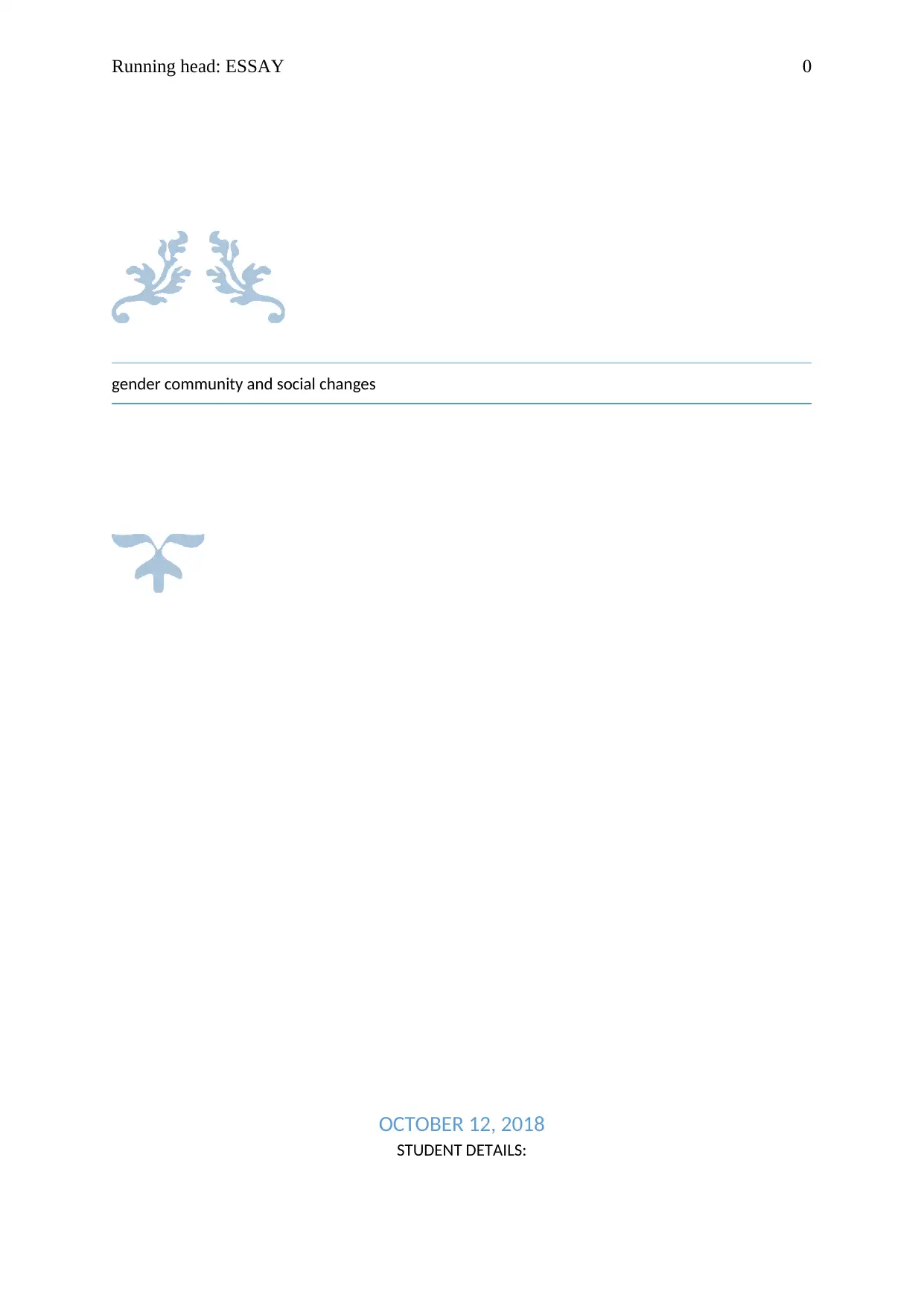
Running head: ESSAY 0
gender community and social changes
OCTOBER 12, 2018
STUDENT DETAILS:
gender community and social changes
OCTOBER 12, 2018
STUDENT DETAILS:
Secure Best Marks with AI Grader
Need help grading? Try our AI Grader for instant feedback on your assignments.
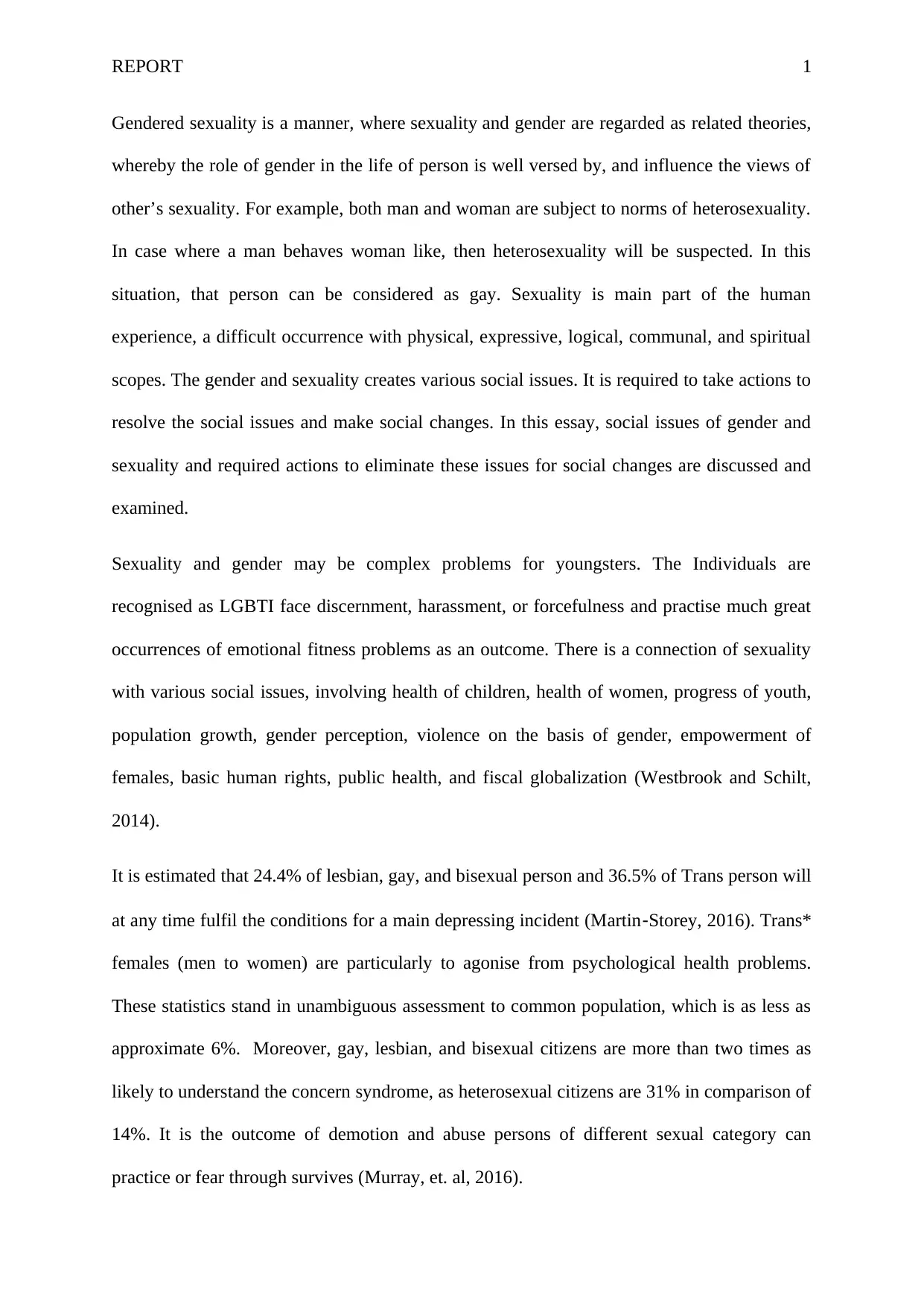
REPORT 1
Gendered sexuality is a manner, where sexuality and gender are regarded as related theories,
whereby the role of gender in the life of person is well versed by, and influence the views of
other’s sexuality. For example, both man and woman are subject to norms of heterosexuality.
In case where a man behaves woman like, then heterosexuality will be suspected. In this
situation, that person can be considered as gay. Sexuality is main part of the human
experience, a difficult occurrence with physical, expressive, logical, communal, and spiritual
scopes. The gender and sexuality creates various social issues. It is required to take actions to
resolve the social issues and make social changes. In this essay, social issues of gender and
sexuality and required actions to eliminate these issues for social changes are discussed and
examined.
Sexuality and gender may be complex problems for youngsters. The Individuals are
recognised as LGBTI face discernment, harassment, or forcefulness and practise much great
occurrences of emotional fitness problems as an outcome. There is a connection of sexuality
with various social issues, involving health of children, health of women, progress of youth,
population growth, gender perception, violence on the basis of gender, empowerment of
females, basic human rights, public health, and fiscal globalization (Westbrook and Schilt,
2014).
It is estimated that 24.4% of lesbian, gay, and bisexual person and 36.5% of Trans person will
at any time fulfil the conditions for a main depressing incident (Martin‐Storey, 2016). Trans*
females (men to women) are particularly to agonise from psychological health problems.
These statistics stand in unambiguous assessment to common population, which is as less as
approximate 6%. Moreover, gay, lesbian, and bisexual citizens are more than two times as
likely to understand the concern syndrome, as heterosexual citizens are 31% in comparison of
14%. It is the outcome of demotion and abuse persons of different sexual category can
practice or fear through survives (Murray, et. al, 2016).
Gendered sexuality is a manner, where sexuality and gender are regarded as related theories,
whereby the role of gender in the life of person is well versed by, and influence the views of
other’s sexuality. For example, both man and woman are subject to norms of heterosexuality.
In case where a man behaves woman like, then heterosexuality will be suspected. In this
situation, that person can be considered as gay. Sexuality is main part of the human
experience, a difficult occurrence with physical, expressive, logical, communal, and spiritual
scopes. The gender and sexuality creates various social issues. It is required to take actions to
resolve the social issues and make social changes. In this essay, social issues of gender and
sexuality and required actions to eliminate these issues for social changes are discussed and
examined.
Sexuality and gender may be complex problems for youngsters. The Individuals are
recognised as LGBTI face discernment, harassment, or forcefulness and practise much great
occurrences of emotional fitness problems as an outcome. There is a connection of sexuality
with various social issues, involving health of children, health of women, progress of youth,
population growth, gender perception, violence on the basis of gender, empowerment of
females, basic human rights, public health, and fiscal globalization (Westbrook and Schilt,
2014).
It is estimated that 24.4% of lesbian, gay, and bisexual person and 36.5% of Trans person will
at any time fulfil the conditions for a main depressing incident (Martin‐Storey, 2016). Trans*
females (men to women) are particularly to agonise from psychological health problems.
These statistics stand in unambiguous assessment to common population, which is as less as
approximate 6%. Moreover, gay, lesbian, and bisexual citizens are more than two times as
likely to understand the concern syndrome, as heterosexual citizens are 31% in comparison of
14%. It is the outcome of demotion and abuse persons of different sexual category can
practice or fear through survives (Murray, et. al, 2016).
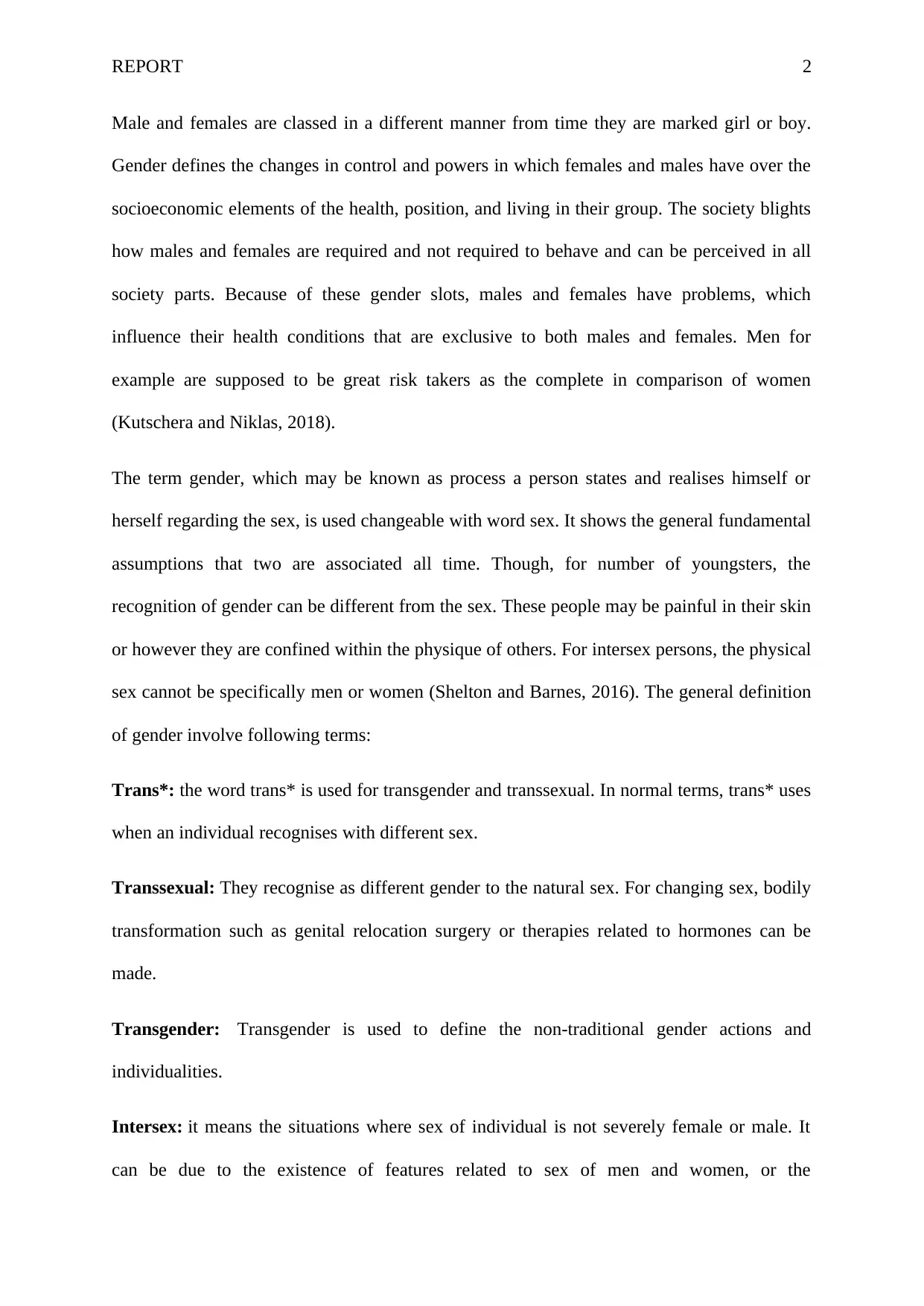
REPORT 2
Male and females are classed in a different manner from time they are marked girl or boy.
Gender defines the changes in control and powers in which females and males have over the
socioeconomic elements of the health, position, and living in their group. The society blights
how males and females are required and not required to behave and can be perceived in all
society parts. Because of these gender slots, males and females have problems, which
influence their health conditions that are exclusive to both males and females. Men for
example are supposed to be great risk takers as the complete in comparison of women
(Kutschera and Niklas, 2018).
The term gender, which may be known as process a person states and realises himself or
herself regarding the sex, is used changeable with word sex. It shows the general fundamental
assumptions that two are associated all time. Though, for number of youngsters, the
recognition of gender can be different from the sex. These people may be painful in their skin
or however they are confined within the physique of others. For intersex persons, the physical
sex cannot be specifically men or women (Shelton and Barnes, 2016). The general definition
of gender involve following terms:
Trans*: the word trans* is used for transgender and transsexual. In normal terms, trans* uses
when an individual recognises with different sex.
Transsexual: They recognise as different gender to the natural sex. For changing sex, bodily
transformation such as genital relocation surgery or therapies related to hormones can be
made.
Transgender: Transgender is used to define the non-traditional gender actions and
individualities.
Intersex: it means the situations where sex of individual is not severely female or male. It
can be due to the existence of features related to sex of men and women, or the
Male and females are classed in a different manner from time they are marked girl or boy.
Gender defines the changes in control and powers in which females and males have over the
socioeconomic elements of the health, position, and living in their group. The society blights
how males and females are required and not required to behave and can be perceived in all
society parts. Because of these gender slots, males and females have problems, which
influence their health conditions that are exclusive to both males and females. Men for
example are supposed to be great risk takers as the complete in comparison of women
(Kutschera and Niklas, 2018).
The term gender, which may be known as process a person states and realises himself or
herself regarding the sex, is used changeable with word sex. It shows the general fundamental
assumptions that two are associated all time. Though, for number of youngsters, the
recognition of gender can be different from the sex. These people may be painful in their skin
or however they are confined within the physique of others. For intersex persons, the physical
sex cannot be specifically men or women (Shelton and Barnes, 2016). The general definition
of gender involve following terms:
Trans*: the word trans* is used for transgender and transsexual. In normal terms, trans* uses
when an individual recognises with different sex.
Transsexual: They recognise as different gender to the natural sex. For changing sex, bodily
transformation such as genital relocation surgery or therapies related to hormones can be
made.
Transgender: Transgender is used to define the non-traditional gender actions and
individualities.
Intersex: it means the situations where sex of individual is not severely female or male. It
can be due to the existence of features related to sex of men and women, or the
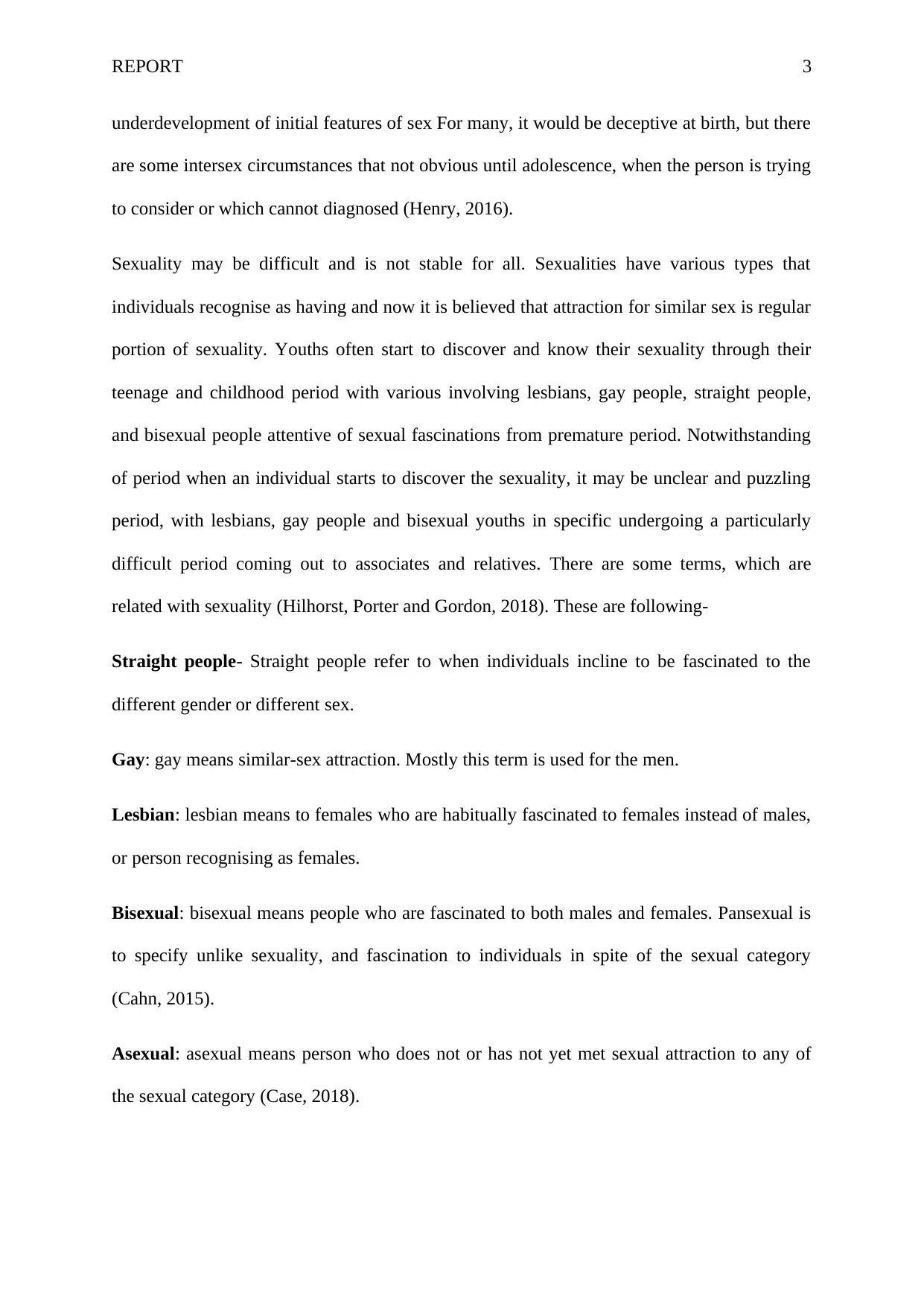
REPORT 3
underdevelopment of initial features of sex For many, it would be deceptive at birth, but there
are some intersex circumstances that not obvious until adolescence, when the person is trying
to consider or which cannot diagnosed (Henry, 2016).
Sexuality may be difficult and is not stable for all. Sexualities have various types that
individuals recognise as having and now it is believed that attraction for similar sex is regular
portion of sexuality. Youths often start to discover and know their sexuality through their
teenage and childhood period with various involving lesbians, gay people, straight people,
and bisexual people attentive of sexual fascinations from premature period. Notwithstanding
of period when an individual starts to discover the sexuality, it may be unclear and puzzling
period, with lesbians, gay people and bisexual youths in specific undergoing a particularly
difficult period coming out to associates and relatives. There are some terms, which are
related with sexuality (Hilhorst, Porter and Gordon, 2018). These are following-
Straight people- Straight people refer to when individuals incline to be fascinated to the
different gender or different sex.
Gay: gay means similar-sex attraction. Mostly this term is used for the men.
Lesbian: lesbian means to females who are habitually fascinated to females instead of males,
or person recognising as females.
Bisexual: bisexual means people who are fascinated to both males and females. Pansexual is
to specify unlike sexuality, and fascination to individuals in spite of the sexual category
(Cahn, 2015).
Asexual: asexual means person who does not or has not yet met sexual attraction to any of
the sexual category (Case, 2018).
underdevelopment of initial features of sex For many, it would be deceptive at birth, but there
are some intersex circumstances that not obvious until adolescence, when the person is trying
to consider or which cannot diagnosed (Henry, 2016).
Sexuality may be difficult and is not stable for all. Sexualities have various types that
individuals recognise as having and now it is believed that attraction for similar sex is regular
portion of sexuality. Youths often start to discover and know their sexuality through their
teenage and childhood period with various involving lesbians, gay people, straight people,
and bisexual people attentive of sexual fascinations from premature period. Notwithstanding
of period when an individual starts to discover the sexuality, it may be unclear and puzzling
period, with lesbians, gay people and bisexual youths in specific undergoing a particularly
difficult period coming out to associates and relatives. There are some terms, which are
related with sexuality (Hilhorst, Porter and Gordon, 2018). These are following-
Straight people- Straight people refer to when individuals incline to be fascinated to the
different gender or different sex.
Gay: gay means similar-sex attraction. Mostly this term is used for the men.
Lesbian: lesbian means to females who are habitually fascinated to females instead of males,
or person recognising as females.
Bisexual: bisexual means people who are fascinated to both males and females. Pansexual is
to specify unlike sexuality, and fascination to individuals in spite of the sexual category
(Cahn, 2015).
Asexual: asexual means person who does not or has not yet met sexual attraction to any of
the sexual category (Case, 2018).
Secure Best Marks with AI Grader
Need help grading? Try our AI Grader for instant feedback on your assignments.
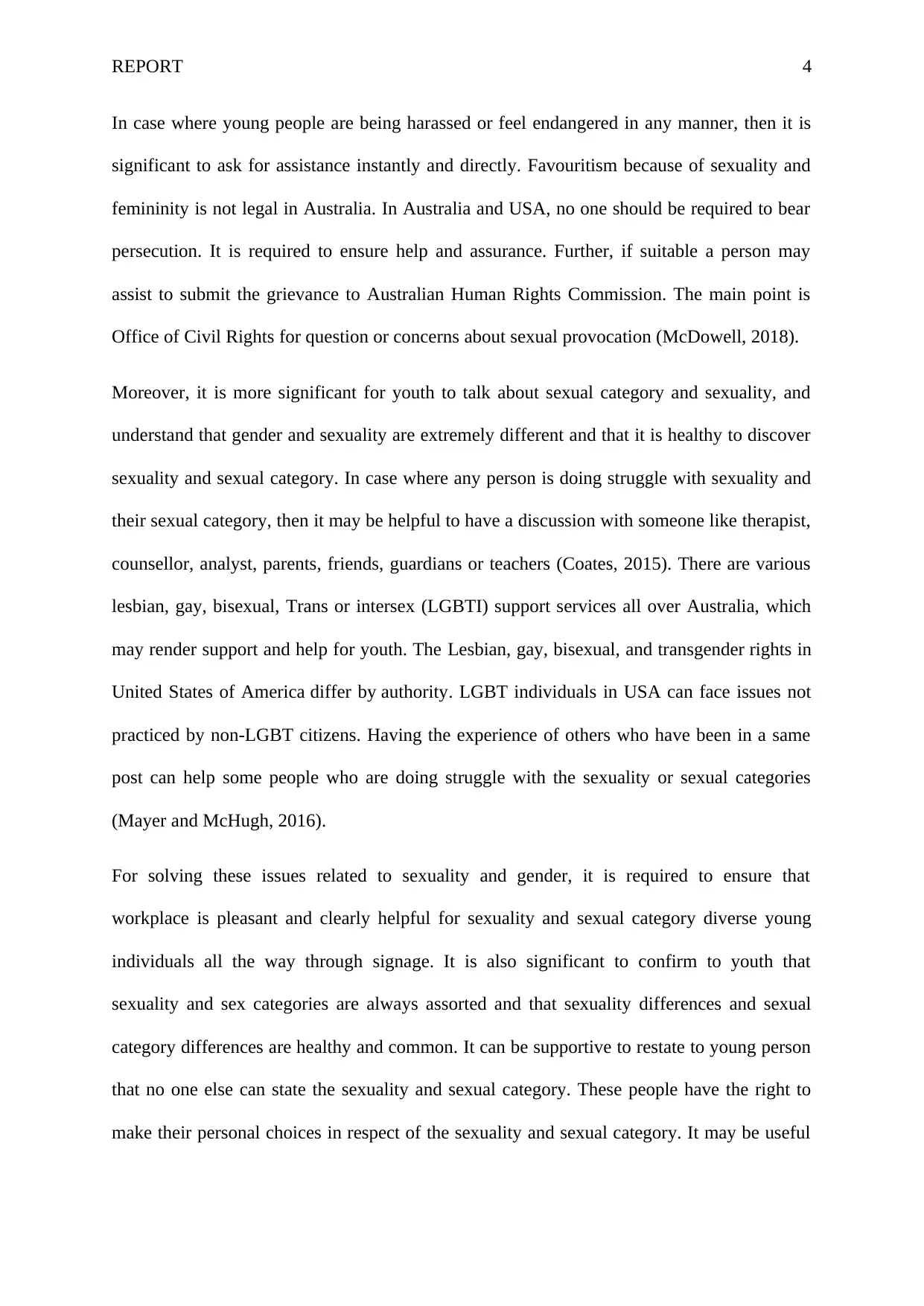
REPORT 4
In case where young people are being harassed or feel endangered in any manner, then it is
significant to ask for assistance instantly and directly. Favouritism because of sexuality and
femininity is not legal in Australia. In Australia and USA, no one should be required to bear
persecution. It is required to ensure help and assurance. Further, if suitable a person may
assist to submit the grievance to Australian Human Rights Commission. The main point is
Office of Civil Rights for question or concerns about sexual provocation (McDowell, 2018).
Moreover, it is more significant for youth to talk about sexual category and sexuality, and
understand that gender and sexuality are extremely different and that it is healthy to discover
sexuality and sexual category. In case where any person is doing struggle with sexuality and
their sexual category, then it may be helpful to have a discussion with someone like therapist,
counsellor, analyst, parents, friends, guardians or teachers (Coates, 2015). There are various
lesbian, gay, bisexual, Trans or intersex (LGBTI) support services all over Australia, which
may render support and help for youth. The Lesbian, gay, bisexual, and transgender rights in
United States of America differ by authority. LGBT individuals in USA can face issues not
practiced by non-LGBT citizens. Having the experience of others who have been in a same
post can help some people who are doing struggle with the sexuality or sexual categories
(Mayer and McHugh, 2016).
For solving these issues related to sexuality and gender, it is required to ensure that
workplace is pleasant and clearly helpful for sexuality and sexual category diverse young
individuals all the way through signage. It is also significant to confirm to youth that
sexuality and sex categories are always assorted and that sexuality differences and sexual
category differences are healthy and common. It can be supportive to restate to young person
that no one else can state the sexuality and sexual category. These people have the right to
make their personal choices in respect of the sexuality and sexual category. It may be useful
In case where young people are being harassed or feel endangered in any manner, then it is
significant to ask for assistance instantly and directly. Favouritism because of sexuality and
femininity is not legal in Australia. In Australia and USA, no one should be required to bear
persecution. It is required to ensure help and assurance. Further, if suitable a person may
assist to submit the grievance to Australian Human Rights Commission. The main point is
Office of Civil Rights for question or concerns about sexual provocation (McDowell, 2018).
Moreover, it is more significant for youth to talk about sexual category and sexuality, and
understand that gender and sexuality are extremely different and that it is healthy to discover
sexuality and sexual category. In case where any person is doing struggle with sexuality and
their sexual category, then it may be helpful to have a discussion with someone like therapist,
counsellor, analyst, parents, friends, guardians or teachers (Coates, 2015). There are various
lesbian, gay, bisexual, Trans or intersex (LGBTI) support services all over Australia, which
may render support and help for youth. The Lesbian, gay, bisexual, and transgender rights in
United States of America differ by authority. LGBT individuals in USA can face issues not
practiced by non-LGBT citizens. Having the experience of others who have been in a same
post can help some people who are doing struggle with the sexuality or sexual categories
(Mayer and McHugh, 2016).
For solving these issues related to sexuality and gender, it is required to ensure that
workplace is pleasant and clearly helpful for sexuality and sexual category diverse young
individuals all the way through signage. It is also significant to confirm to youth that
sexuality and sex categories are always assorted and that sexuality differences and sexual
category differences are healthy and common. It can be supportive to restate to young person
that no one else can state the sexuality and sexual category. These people have the right to
make their personal choices in respect of the sexuality and sexual category. It may be useful
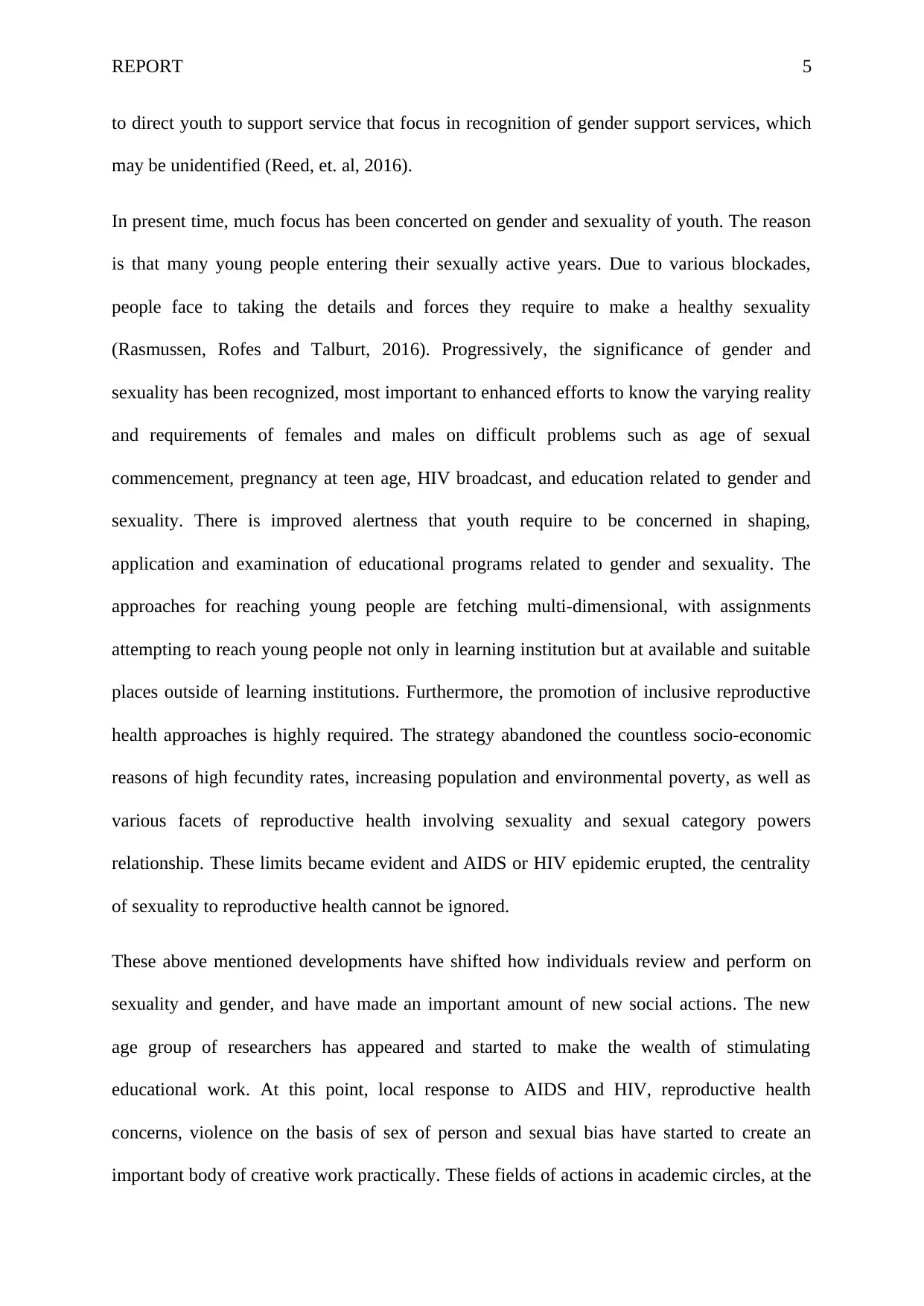
REPORT 5
to direct youth to support service that focus in recognition of gender support services, which
may be unidentified (Reed, et. al, 2016).
In present time, much focus has been concerted on gender and sexuality of youth. The reason
is that many young people entering their sexually active years. Due to various blockades,
people face to taking the details and forces they require to make a healthy sexuality
(Rasmussen, Rofes and Talburt, 2016). Progressively, the significance of gender and
sexuality has been recognized, most important to enhanced efforts to know the varying reality
and requirements of females and males on difficult problems such as age of sexual
commencement, pregnancy at teen age, HIV broadcast, and education related to gender and
sexuality. There is improved alertness that youth require to be concerned in shaping,
application and examination of educational programs related to gender and sexuality. The
approaches for reaching young people are fetching multi-dimensional, with assignments
attempting to reach young people not only in learning institution but at available and suitable
places outside of learning institutions. Furthermore, the promotion of inclusive reproductive
health approaches is highly required. The strategy abandoned the countless socio-economic
reasons of high fecundity rates, increasing population and environmental poverty, as well as
various facets of reproductive health involving sexuality and sexual category powers
relationship. These limits became evident and AIDS or HIV epidemic erupted, the centrality
of sexuality to reproductive health cannot be ignored.
These above mentioned developments have shifted how individuals review and perform on
sexuality and gender, and have made an important amount of new social actions. The new
age group of researchers has appeared and started to make the wealth of stimulating
educational work. At this point, local response to AIDS and HIV, reproductive health
concerns, violence on the basis of sex of person and sexual bias have started to create an
important body of creative work practically. These fields of actions in academic circles, at the
to direct youth to support service that focus in recognition of gender support services, which
may be unidentified (Reed, et. al, 2016).
In present time, much focus has been concerted on gender and sexuality of youth. The reason
is that many young people entering their sexually active years. Due to various blockades,
people face to taking the details and forces they require to make a healthy sexuality
(Rasmussen, Rofes and Talburt, 2016). Progressively, the significance of gender and
sexuality has been recognized, most important to enhanced efforts to know the varying reality
and requirements of females and males on difficult problems such as age of sexual
commencement, pregnancy at teen age, HIV broadcast, and education related to gender and
sexuality. There is improved alertness that youth require to be concerned in shaping,
application and examination of educational programs related to gender and sexuality. The
approaches for reaching young people are fetching multi-dimensional, with assignments
attempting to reach young people not only in learning institution but at available and suitable
places outside of learning institutions. Furthermore, the promotion of inclusive reproductive
health approaches is highly required. The strategy abandoned the countless socio-economic
reasons of high fecundity rates, increasing population and environmental poverty, as well as
various facets of reproductive health involving sexuality and sexual category powers
relationship. These limits became evident and AIDS or HIV epidemic erupted, the centrality
of sexuality to reproductive health cannot be ignored.
These above mentioned developments have shifted how individuals review and perform on
sexuality and gender, and have made an important amount of new social actions. The new
age group of researchers has appeared and started to make the wealth of stimulating
educational work. At this point, local response to AIDS and HIV, reproductive health
concerns, violence on the basis of sex of person and sexual bias have started to create an
important body of creative work practically. These fields of actions in academic circles, at the
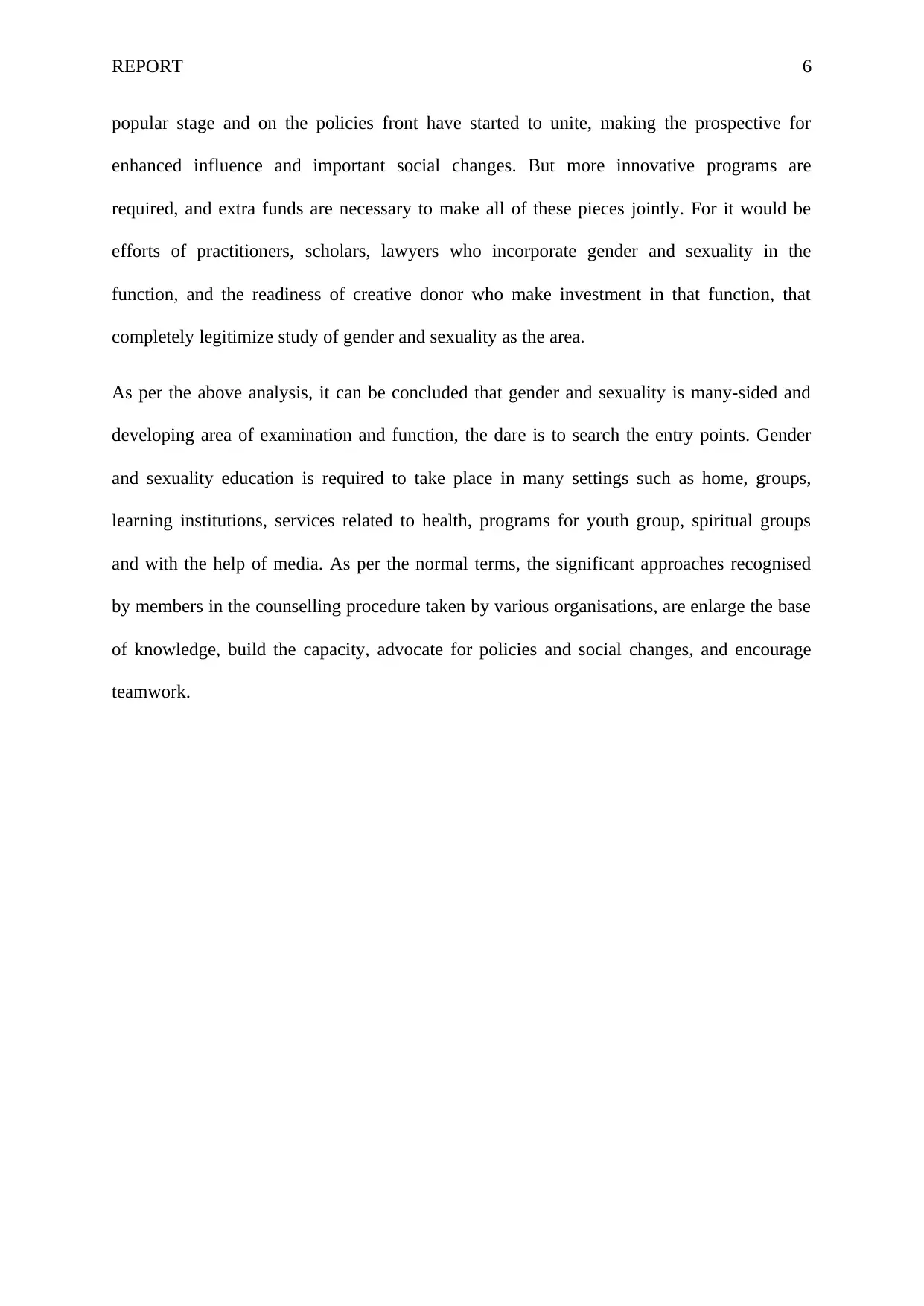
REPORT 6
popular stage and on the policies front have started to unite, making the prospective for
enhanced influence and important social changes. But more innovative programs are
required, and extra funds are necessary to make all of these pieces jointly. For it would be
efforts of practitioners, scholars, lawyers who incorporate gender and sexuality in the
function, and the readiness of creative donor who make investment in that function, that
completely legitimize study of gender and sexuality as the area.
As per the above analysis, it can be concluded that gender and sexuality is many-sided and
developing area of examination and function, the dare is to search the entry points. Gender
and sexuality education is required to take place in many settings such as home, groups,
learning institutions, services related to health, programs for youth group, spiritual groups
and with the help of media. As per the normal terms, the significant approaches recognised
by members in the counselling procedure taken by various organisations, are enlarge the base
of knowledge, build the capacity, advocate for policies and social changes, and encourage
teamwork.
popular stage and on the policies front have started to unite, making the prospective for
enhanced influence and important social changes. But more innovative programs are
required, and extra funds are necessary to make all of these pieces jointly. For it would be
efforts of practitioners, scholars, lawyers who incorporate gender and sexuality in the
function, and the readiness of creative donor who make investment in that function, that
completely legitimize study of gender and sexuality as the area.
As per the above analysis, it can be concluded that gender and sexuality is many-sided and
developing area of examination and function, the dare is to search the entry points. Gender
and sexuality education is required to take place in many settings such as home, groups,
learning institutions, services related to health, programs for youth group, spiritual groups
and with the help of media. As per the normal terms, the significant approaches recognised
by members in the counselling procedure taken by various organisations, are enlarge the base
of knowledge, build the capacity, advocate for policies and social changes, and encourage
teamwork.
Paraphrase This Document
Need a fresh take? Get an instant paraphrase of this document with our AI Paraphraser
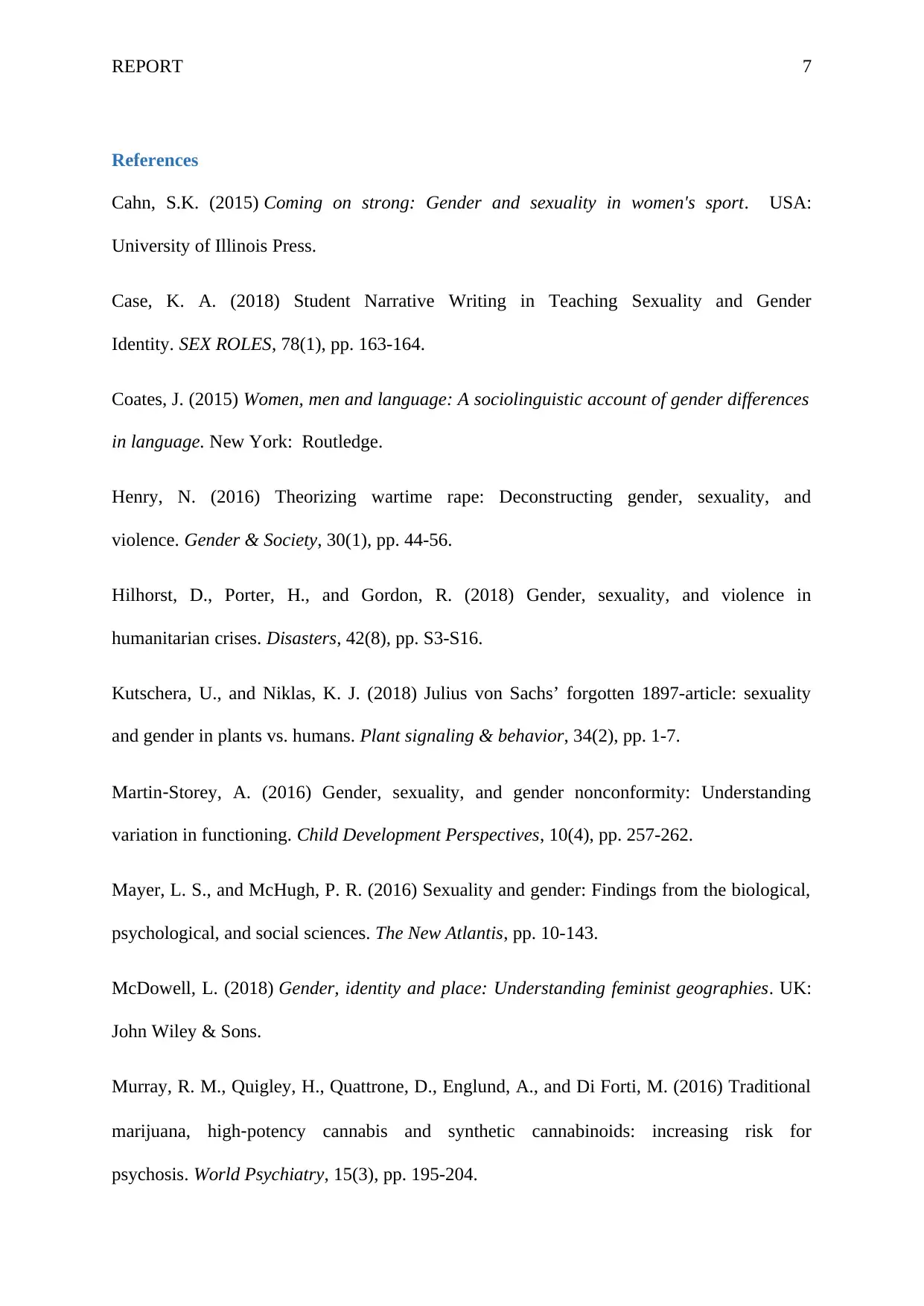
REPORT 7
References
Cahn, S.K. (2015) Coming on strong: Gender and sexuality in women's sport. USA:
University of Illinois Press.
Case, K. A. (2018) Student Narrative Writing in Teaching Sexuality and Gender
Identity. SEX ROLES, 78(1), pp. 163-164.
Coates, J. (2015) Women, men and language: A sociolinguistic account of gender differences
in language. New York: Routledge.
Henry, N. (2016) Theorizing wartime rape: Deconstructing gender, sexuality, and
violence. Gender & Society, 30(1), pp. 44-56.
Hilhorst, D., Porter, H., and Gordon, R. (2018) Gender, sexuality, and violence in
humanitarian crises. Disasters, 42(8), pp. S3-S16.
Kutschera, U., and Niklas, K. J. (2018) Julius von Sachs’ forgotten 1897-article: sexuality
and gender in plants vs. humans. Plant signaling & behavior, 34(2), pp. 1-7.
Martin‐Storey, A. (2016) Gender, sexuality, and gender nonconformity: Understanding
variation in functioning. Child Development Perspectives, 10(4), pp. 257-262.
Mayer, L. S., and McHugh, P. R. (2016) Sexuality and gender: Findings from the biological,
psychological, and social sciences. The New Atlantis, pp. 10-143.
McDowell, L. (2018) Gender, identity and place: Understanding feminist geographies. UK:
John Wiley & Sons.
Murray, R. M., Quigley, H., Quattrone, D., Englund, A., and Di Forti, M. (2016) Traditional
marijuana, high‐potency cannabis and synthetic cannabinoids: increasing risk for
psychosis. World Psychiatry, 15(3), pp. 195-204.
References
Cahn, S.K. (2015) Coming on strong: Gender and sexuality in women's sport. USA:
University of Illinois Press.
Case, K. A. (2018) Student Narrative Writing in Teaching Sexuality and Gender
Identity. SEX ROLES, 78(1), pp. 163-164.
Coates, J. (2015) Women, men and language: A sociolinguistic account of gender differences
in language. New York: Routledge.
Henry, N. (2016) Theorizing wartime rape: Deconstructing gender, sexuality, and
violence. Gender & Society, 30(1), pp. 44-56.
Hilhorst, D., Porter, H., and Gordon, R. (2018) Gender, sexuality, and violence in
humanitarian crises. Disasters, 42(8), pp. S3-S16.
Kutschera, U., and Niklas, K. J. (2018) Julius von Sachs’ forgotten 1897-article: sexuality
and gender in plants vs. humans. Plant signaling & behavior, 34(2), pp. 1-7.
Martin‐Storey, A. (2016) Gender, sexuality, and gender nonconformity: Understanding
variation in functioning. Child Development Perspectives, 10(4), pp. 257-262.
Mayer, L. S., and McHugh, P. R. (2016) Sexuality and gender: Findings from the biological,
psychological, and social sciences. The New Atlantis, pp. 10-143.
McDowell, L. (2018) Gender, identity and place: Understanding feminist geographies. UK:
John Wiley & Sons.
Murray, R. M., Quigley, H., Quattrone, D., Englund, A., and Di Forti, M. (2016) Traditional
marijuana, high‐potency cannabis and synthetic cannabinoids: increasing risk for
psychosis. World Psychiatry, 15(3), pp. 195-204.
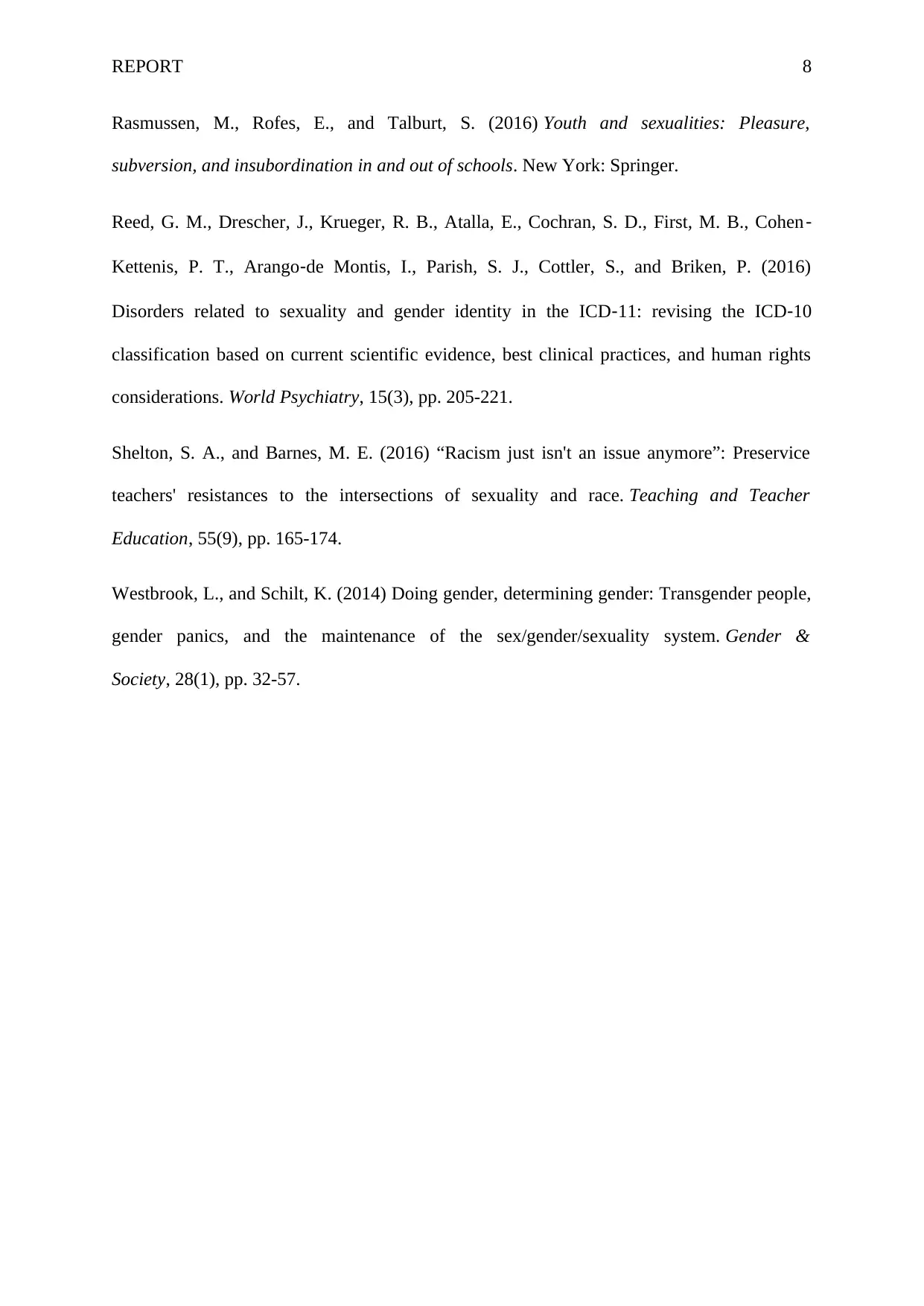
REPORT 8
Rasmussen, M., Rofes, E., and Talburt, S. (2016) Youth and sexualities: Pleasure,
subversion, and insubordination in and out of schools. New York: Springer.
Reed, G. M., Drescher, J., Krueger, R. B., Atalla, E., Cochran, S. D., First, M. B., Cohen‐
Kettenis, P. T., Arango‐de Montis, I., Parish, S. J., Cottler, S., and Briken, P. (2016)
Disorders related to sexuality and gender identity in the ICD‐11: revising the ICD‐10
classification based on current scientific evidence, best clinical practices, and human rights
considerations. World Psychiatry, 15(3), pp. 205-221.
Shelton, S. A., and Barnes, M. E. (2016) “Racism just isn't an issue anymore”: Preservice
teachers' resistances to the intersections of sexuality and race. Teaching and Teacher
Education, 55(9), pp. 165-174.
Westbrook, L., and Schilt, K. (2014) Doing gender, determining gender: Transgender people,
gender panics, and the maintenance of the sex/gender/sexuality system. Gender &
Society, 28(1), pp. 32-57.
Rasmussen, M., Rofes, E., and Talburt, S. (2016) Youth and sexualities: Pleasure,
subversion, and insubordination in and out of schools. New York: Springer.
Reed, G. M., Drescher, J., Krueger, R. B., Atalla, E., Cochran, S. D., First, M. B., Cohen‐
Kettenis, P. T., Arango‐de Montis, I., Parish, S. J., Cottler, S., and Briken, P. (2016)
Disorders related to sexuality and gender identity in the ICD‐11: revising the ICD‐10
classification based on current scientific evidence, best clinical practices, and human rights
considerations. World Psychiatry, 15(3), pp. 205-221.
Shelton, S. A., and Barnes, M. E. (2016) “Racism just isn't an issue anymore”: Preservice
teachers' resistances to the intersections of sexuality and race. Teaching and Teacher
Education, 55(9), pp. 165-174.
Westbrook, L., and Schilt, K. (2014) Doing gender, determining gender: Transgender people,
gender panics, and the maintenance of the sex/gender/sexuality system. Gender &
Society, 28(1), pp. 32-57.
1 out of 9
Related Documents
Your All-in-One AI-Powered Toolkit for Academic Success.
+13062052269
info@desklib.com
Available 24*7 on WhatsApp / Email
![[object Object]](/_next/static/media/star-bottom.7253800d.svg)
Unlock your academic potential
© 2024 | Zucol Services PVT LTD | All rights reserved.





